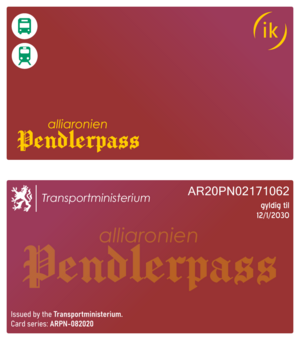Pendlerpass
This article is incomplete because it is pending further input from participants, or it is a work-in-progress by one author. Please comment on this article's talk page to share your input, comments and questions. Note: To contribute to this article, you may need to seek help from the author(s) of this page. |
| Note by Tsumiki: Any information here is subject to change. This article is a work in progress. |
 August 2020 edition of the Pendlerpass | |
| Location | Alliaronia, Goyanes, and ik-kort-optimised networks |
|---|---|
| Launched | June 15, 2019 |
| Operator | Transportministerium |
| Manager | Transportministerium |
| Currency | Goyanean dram (Δ) (Δ500,000 maximum load) |
| Credit expiry | 10 years |
| Validity |
|
| Retailed | |
The Pendlerpass (lit. commuter's pass) is a type of a contactless smart card made by the Transportministerium exclusively for use on all modes of Alliaronian public transportation. It was created in 2019 under the behest of the Transportation Rehabilitation Act of 2018; which primarily targeted on deprecating the practice of cash payments and integrating innovative technologies. Negotiations with Goyanes resulted in integration with the Gojan ik-kort network upon its release, allowing Alliaronian commuters to use their Pendlerpasses on the Høyhastikettog.
The Pendlerpasses are nationalised cards, and all cards are subject within the jurisdiction of Alliaronian laws of the Transportministerium. However, with its integration on the Gojan ik-kort network, the cards have been in circulation all around the Western Gothis area. The cards are officially sold on vending machines and convenience stores in both Alliaronia and Goyanes, and as such are valid for public transport use in both countries. Integration within the Grenseverein area has been also considered.
Background
In 2018, lawmakers in the Riksdatt petitioned a bill that would be then known as the Transportation Rehabilitation Act. The bill stated the deprecation of traditional payment of drams through physical cash, not only to curb crimes and to avoid human error, but also to curb the rising problem of paper tickets being disposed in the massive Alliaronian mass transit system. Sanitation workers stated that 40% to 60% of waste collected on train stations alone comprised of discarded tickets, the other being food containers and scraps.
Despite rigorous campaign and innovation done by the Transportministerium to advocate recycling of paper and other measures to curb such, another innovation was needed - and that came through the introduction of the ik-kort's exclusive cards for use in the HHT. The bill was then signed into force with nil opposition, and the Transportministerium was given a Δ2.5 billion budget for R&D on creating a similar card to the ik-kort system to innovate the Alliaronian mass transit system.
History
Development of the Pendlerpass began swiftly after the passing of the Act. The Transportministerium secured deals and contracts with the ik-kort network to replicate and integrate the future Pendlerpass to their network, in which it gained approval. With assistance, the swift development of the card eventually paid off, with the first ten test Pendlerpass cards working perfectly.
Finalization, bug-fixing, and integration to the entire mass-transit network of Alliaronia, however, took longer: the Transportministerium had to facilitate on installation of tap-to-pay card readers on all buses and fare gates of train stations across the country. When this task was completed, the Transportministerium officially announced the circulation of the cards on June 2019, in time for the tedious working months and the beginning of the academic year. The first circulations were half a million, but production rapidly rose after the cards consequently became popular, especially for students.
Despite these modern integrations, traditional methods of paper tickets being issued remained, however, compared to before, was not as much. A survey conducted in early 2020 showed that 85% of Alliaronians started using the Pendlerpass for their daily commute.
System
The Pendlerpass is a reloadable smart card. It can store up to Δ500,000; with a very long lifetime rate of 10 years.

